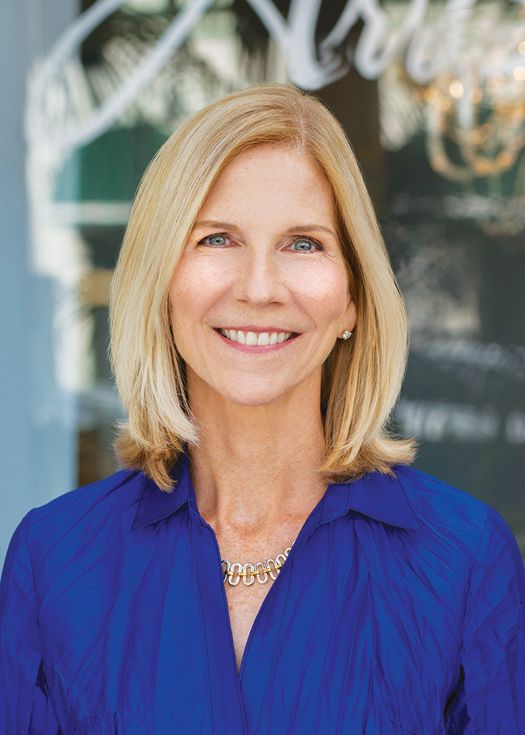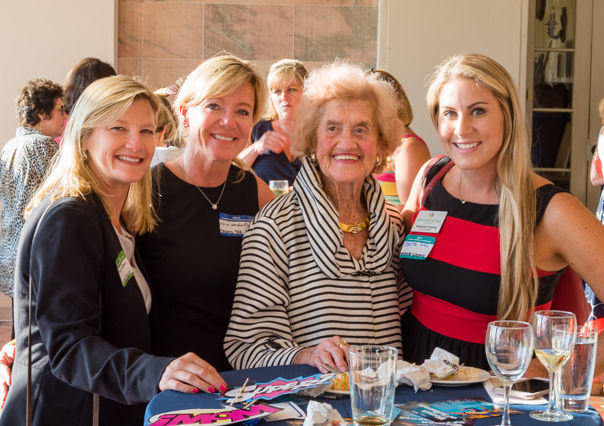From the Editor: Betty Schoenbaum's Love and Philanthropy Helped Shape Sarasota

Susan Burns
Image: Lori Sax
Until I saw the documentary Won’t You Be My Neighbor?, I hadn’t thought about Mister Rogers for a long time. He was a soundtrack in my childhood, though. My twin sister and I used to walk home for lunch from elementary school in the ’60s and eat peanut butter and jelly sandwiches in front of the TV and watch his show, which was produced in a little studio in downtown Pittsburgh, my hometown. As I got older, I knew he wasn’t cool to like, with his tennis shoes and cardigan and the deliberate way he fed his fish and sang corny songs. But, secretly, I loved him. His neighborhood felt safe, honest and good. Fred Rogers loved everyone unconditionally and thought we were all worthy of dignity and respect. Mister Rogers’ Neighborhood belonged to everyone.
I thought about him again when Sarasota philanthropist Betty Schoenbaum died just shy of her 101st birthday on July 31. I didn’t really know Betty, although we had spoken at different events over the years. She was always one of the most fashionable women, always conversant, keenly interested in your life and, of course, always smiling. She made everyone feel important, and it felt good to be in her orbit.
She and her late husband, Alex, the founder of the Shoney’s restaurant chain, gave away tens of millions to charities here, in their native West Virginia and in Israel. After Alex died in 1996, she gave millions more. Tributes poured in from leaders of the nonprofits she donated to, among them Glasser/Schoenbaum Human Services Center, the Women’s Resource Center and the Salvation Army. She also gave to a number of educational institutions, providing money for thousands of scholarships. Shelves in her apartment were filled with binders where she kept the thank-you notes from recipients, and she loved looking at them, says her close friend Phil King, who ran Glasser/Schoenbaum for five years.
But Betty is remembered even more for the uninhibited and infectiously joyful way in which she gave. A recent study reports that 50 percent of feeling cheerful and optimistic is in our genes, and I’m sure that Betty was a winner in that genetic lottery. By the same reasoning, 50 percent of happiness can also be acquired, and Betty understood that, too. She was famous for saying, “the joy of living is the joy of giving.” Her charity energized her, and it also inspired. Betty was a tangible example that helping others just might be the ticket to a meaningful life.

Betty Schoenbaum in 2017 at our Women of Influence celebration.
Image: Atelier Media
This issue is filled with examples of that. Our Guide to Giving lists almost 600 nonprofits—all of them partners in the Community Foundation of Sarasota County’s Giving Partner, which means you can examine their leadership, financial history and impact. If your passion is animals, youth, the environment, the arts or human services, this directory will help you choose where to spend your talents and donate your dollars.
We have other Bettys in this issue, too. Cooper Levey-Baker’s moving story, “Breaking Away," about a woman who is rebuilding her life after years of domestic violence, is a tribute to this woman’s courage to change and to the employees of Safe Place and Rape Crisis Center (SPARCC) who have dedicated their careers to helping women and men escape dangerous situations. Just as inspiring is that this nonprofit was started 40 years ago by 13 fearless and determined Sarasota women who fought the status quo to bring attention and services to victims.
We also profile four volunteers who are making a difference. Three retired here fairly recently and jumped into the nonprofit world, donating hours and hours each week—in Bill Keenan’s case, who donates to Feeding Empty Little Tummies, an organization that makes sure homeless children get nutritious meals, 35 hours a week. These volunteers make clear that giving is not just a benefit to the receiver. Kathy Walker Van Citters, who donates her time reading to young boys at Visible Men Academy, says caring for others and sharing in their triumphs as they learn to read helped to ease the grief of losing her husband. “I come away with so much more than I am able to give,” she told us.
Betty knew that satisfaction countless times. “Love and work are the cornerstones of our humanness,” wrote Freud, and we were fortunate Betty’s love and philanthropic work happened in our neighborhood. She knew that if we cared for others we might just love ourselves a little bit more, too, and that would be good for all of us.



